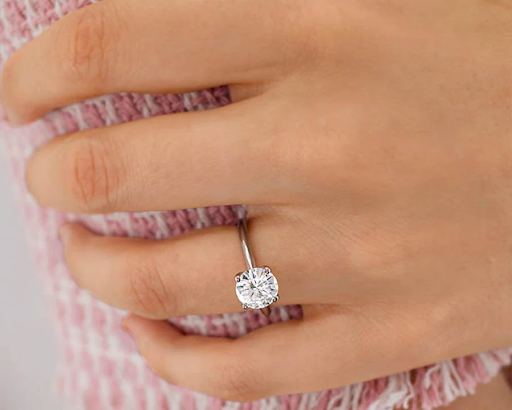Lab created diamonds have the identical chemical, optical and physical properties to mined diamonds, making them the closest alternative to mined diamonds. As the name suggests, lab diamonds are created in a laboratory through replicating the high temperatures and high pressure conditions which occur in the Earth’s crust where diamonds are formed. Lab grown diamonds are real diamonds! Displaying the identical sparkle and brilliance as mined diamonds, making it impossible to tell the difference between the two. Lab grown diamonds can be considered more desirable than natural diamonds. This is because they are free from flaws and impurities that are produced in the formation and mining of mined diamonds. Approximately 40% cheaper than mined diamonds with less environmental impacts. However, they are just as luxurious and durable. Lab diamond engagement rings are suitable for those who want a real diamond without the financial and environmental impacts associated with mined diamonds.
Lily Arkwright sources and sets IGI and GIA certified lab diamonds, so you can be sure that your diamond has been expertly crafted.
A very unique gemstone with original optical properties, Moissanite was originally discovered in a meteorite crater in Arizona, United States by acclaimed Nobel prize winner doctor Henri Moissan (the gem’s namesake) in 1893, it earned the title ‘space gemstone’. Rare in nature (even rarer than diamonds), scientists developed an innovative growing process which takes place under strict controlled laboratory conditions, enabling the growth of moissanite engagement rings and other fine jewellery. A special relationship deserves a special gemstone.

Moissanite is a rare and precious gemstone made of silicon carbide that works as a beautiful alternative to the traditional mined diamond engagement ring, and is a wonderful option in its own right. Almost identical to diamonds, Moissanite engagement rings are a beautiful diamond alternative with a gorgeous visual appearance, perfect for brides-to-be desiring an eco-friendly option offering unprecedented shimmer and sparkle. Moissanite is second of all gemstones in terms of hardness, scoring only slightly lower than a diamond at 9.25-9.5 on the Mohs scale, making it incredibly durable and a brilliant choice for engagement rings.
Moissanite is made through a process called thermal decomposition, which happens when a substance is heated and reaches a state where it can chemically decompose. In the case of moissanite this substance is Methylsilane, a colourless gas at room temperature that at the right extreme temperature conditions breaks down into moissanite. This method is overlooked by a team of experts and closely monitored to track its progress. When large single crystals of moissanite have formed, industrial-grade diamond chips are used to cut and polish the stones whilst they are spun around using turntable-like machines.
The major benefit of a lab grown gemstones is that you can have something which is compositionally exactly the same as something formed in the earth billions of years ago, yet without any of the negative side effects mining can cause.

Moissanite and diamonds are very similar to look at and almost impossible to tell apart when compared side by side, however, contrary to popular belief moissanite is not a diamond substitute and is very much its own gemstone. It has a distinctive colour sparkle due to it being more refractive than diamond. The refractive index of a material refers to the speed at which light can travel through it, and moissanite’s chemical structure means that it can slow down and bend the light entering it much better than other minerals, making it give off an almost rainbow-like effect. Moissanite is a wonderful alternative as a colourless stone, and due to its optical properties displays a remarkable fieriness.
Common Myths about Moissanite
All moissanite has a colour tint: when the gemstone was first manufactured there was a marginal yellowish or greyish hue but this is no longer the case.
Moissanite is not durable: moissanite is actually the third hardest mineral on the planet and is often used in manufacturing (much like diamond) because of this. It makes for an excellent engagement ring because of these enduring properties as a hard-wearing gemstone suitable for everyday use.
Moissanite turns cloudy over time: unlike cubic zirconia, a diamond simulant that turns cloudy over time, moissanite does not and remains crystal clear.
Lily Arkwright offers the worlds premium moissanite by Charles & Colvard, Forever One. The original moissanite creator, Charles & Colvard Forever One clarity is rated “internally flawless” to “very slightly included” range. With over 20 years experience and through relentless innovation in producing, cutting and polishing moissanite stones, Forever One is an ethical and sustainable gemstone and its quality is unsurpassed worldwide. Using a unique patented process to grow each moissanite Charles & Colvard possesses impeccable colour – ten times whiter than standard moissanite – unrivalled cut and clarity, creating a gemstone with exceptional beauty and sparkle.
Every Charles & Colvard Moissanite engagement ring comes with a limited lifetime warranty that guarantees your moissanite stone will maintain its fire and brilliance for your lifetime, representing the lifetime of love between you and your partner and guaranteeing your gemstone remains as beautiful as the day you bought it.
Amazing clarity, beautiful colour and available in a wide selection of cuts and carat sizes. Lily Arkwright are proud Charles & Colvard authorised retailers and set the latest and highest quality Forever One moissanite, available in two grades, Forever One D-F (colourless) and Forever One G-I (near colourless).
Each gemstone is precisely faceted to exact angles and proportions to maximise its brilliance. They stock and set moissanite stones from 0.0021ct and up-to and over 15.00ct and are able to produce custom bespoke designs. They are also members of the National Association of Jewellers (NAJ) and have joined thousands of other jewellery brands operating within the UK to work within their guidelines, being routinely assessed by their compliance team. There is a 12 month warranty on all other jewellery they offer, and a 30 day return policy on all standard collections.
Don’t forget to check out Lily Arkwright’s range of moissanite earrings and pendants, which make for gorgeous bridal sets.
You may be interested in: Gems and Jewelry Market: Growths & Trends

